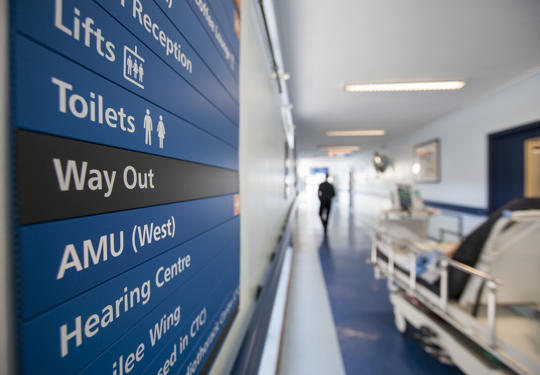In this month’s blog, Dr Hilary Williams, RCP vice president for Wales reflects on the recent inspection of healthcare services, corridor care and waiting times.
Last month, Healthcare Inspectorate Wales (HIW) published its annual report 2023–24, setting out key findings from the regulation, inspection and review of healthcare services across Wales. The report highlights sustained NHS pressure, including workforce shortages, increasing patient demand and ongoing issues in accessing planned and urgent care. Emergency departments are overcrowded with long delays in assessment and treatment.
This is the NHS we work in every day. It’s the NHS our families and friends experience when they get ill. Many of the problems described in this year’s report were also in last year’s report, so it seems as though there’s been little improvement in the past 12 months.
Too many people are being treated in corridors instead of hospital beds. You don’t need me to tell you that this isn’t a dignified way to care for people. It’s also soul-destroying for us as staff. The RCP is entirely supportive of the Royal College of Nursing campaign to end corridor care and I’m pleased to be involved in these discussions on your behalf. Working at 120% capacity is never effective and we’re doing the bare minimum to keep people safe.
How do we solve the problem of waiting times?
Welsh health secretary Jeremy Miles MS recently announced £28 million of investment on NHS Wales waiting times. The new funding will pay for more evening and weekend appointments and better regional working in specialties such as orthopaedics, ophthalmology, general surgery and gynaecology. But we also know that physicians play a critical role in keeping the hospital flow moving, so will any of this be delivered without our acute teams, including our medical registrars who deliver 24/7 general medical care?
In my own specialty, medical oncology, we are increasingly aware that, while new drugs are being funded, there’s no extra money to cover the complex acute care needed to manage consequent toxicities. We will write to the independent review of the NHS in Wales to ensure that the voice of medicine – your voice – is heard.
Better and more focused delivery of care is a frequent theme in my blog, but the system feels stuck. Doctors in Wales are fundamentally important in providing better acute and planned care, as well as training the consultants and senior decision-makers of the future. We need decision making at the front door and experienced management of multiple conditions.
Are we doing enough to attract the right managerial workforce into NHS Wales?
Camilla Cavendish summarised this well for me in her recent article in the Financial Times – she remembered Gerry Robinson, who spent time trying to turn Rotherham General Hospital around, and who told her that ‘the NHS would never improve until it realised that managing complex organisations is a serious business’.
As the recently renamed RCP Resident Doctor Committee starts planning its work for 2025, I do think that many of our resident doctors, particularly our IMT colleagues, are feeling abandoned. They are working relentless shift patterns, feel undervalued without a supportive team structure, and a role limited to the delivery of tasks. I want to hear about your experiences so please get in touch if you have a story to tell about how training has improved locally. We want to showcase as many experiences as possible through our new #NextGen series of blogs – NextGen@rcp.ac.uk. In the meantime, we will continue to work closely with Health Education and Improvement Wales (HEIW) to flag arising issues. We’ll soon announce our programme of hospital visits for 2025 and I’m delighted to report that we had great attendance for our college tutor/associate college tutor conference last week.
And it’s not too late for you to join the debate! We’ll be asking for your ideas about what the next Welsh government should prioritise after the 2026 Senedd election at our Update in medicine – Cardiff in December. If you could wave a magic wand, what would you change? There are a few spaces left at the update itself, but if you can’t attend in person, please get in touch to tell us your thoughts so we can ensure that our policy calls reflect the solutions and challenges you face every day.
Take care.






